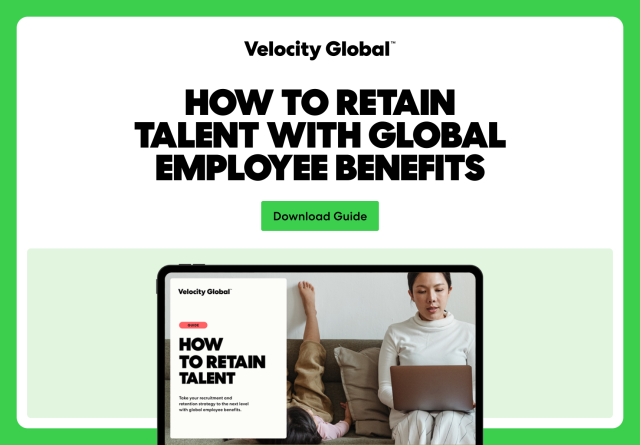As companies expand, they discover the value of a mobile global workforce. By offering employees international opportunities, businesses can explore new markets and gain a competitive advantage in hiring and retaining top talent.
However, when transferring employees abroad, companies often encounter roadblocks in navigating and complying with the unique immigration and employment laws of other countries.
In this guide, we provide top tips for how to compliantly transfer talent abroad and answer your commonly asked questions about international employee relocation.
Why businesses relocate employees internationally
There are several reasons why a company might relocate its employees abroad. Some common reasons for global mobility include the following:
Train or collaborate with international staff
A business might relocate staff abroad to work or collaborate temporarily with employees in another country where it has established an entity. A company may also send an employee to a branch office in a foreign country to train local staff in a particular skill or task.
This global workforce mobility practice of transferring staff for international business activities also enhances workforce diversity and inclusion by allowing talent to better understand and navigate cultural differences among international colleagues.
Test new international markets
Businesses often send staff abroad for a long-term or permanent relocation to perform market research, test a new country for business opportunities, or establish a foreign entity.
Sending employees abroad offers companies unique and strategic insights into new markets. International employees that relocate to another country gain a boots-on-the-ground understanding of that country’s culture, customer base, market needs, and business practices.
Offer talent more location flexibility
Some businesses offer a work-from-anywhere policy to give employees more freedom to be mobile while on the job. This type of employee mobility policy allows talent to relocate or travel abroad for work or personal reasons while maintaining their position with the company.
Considering more working professionals today want the opportunity to work from anywhere, businesses that offer this type of flexible work policy have a significant competitive advantage in hiring and retaining a top-quality workforce.
5 tips for managing international employee transfers
When entering a new market, businesses must understand and abide by market-specific employment and immigration laws—which vary from country to country. Ensuring compliance with foreign laws is critical for avoiding fines, business interruptions, and reputational damage.
Consider the following tips to ensure international employee transfers go smoothly.
1. Review the country’s employment laws
Businesses must understand the local employment laws in the country or countries where they plan to transfer employees. These laws govern things like employment contract requirements, worker classification, and employee entitlements.
In fact, one of the more challenging aspects of moving employees to new countries is navigating termination requirements for employment contracts in new countries.
For example, in the Philippines, the law distinguishes two types of termination: an authorized cause dismissal and a just cause dismissal:
Authorized cause dismissal is for economic or health reasons, and employers are legally required to give employees a 30-day notice of termination. If an employer dismisses an employee for an authorized cause, the employee is entitled to severance pay of at least a half month’s wages for every year worked.
Just cause dismissal is for blameworthy actions such as misconduct, disobedience, neglect, fraud, or crime, and employers are not required to give a notice period. Severance pay is not legally required if an employer terminates the employment relationship for a just cause.
2. Secure relevant visas and work permits
To relocate employees abroad, businesses and their employees must abide by the destination country's immigration laws. Typically, employers must sponsor their employees, obtain the appropriate visas and work permits on their employees’ behalf, and pay any associated foreign worker levies and fees for visa applications, extensions, and renewals.
Each country has its own process for obtaining the right visas and work permits for employee transfers. The type of visa will depend on factors like the employee’s job role, how long they plan to stay in the country, and if they have a spouse or dependents coming with them.
For example, Spain has five types of work visas: the Long-Term work visa, Seasonal work visa, Au Pair work visa, EU Blue Card visa, and Self-Employed visa. Spain’s standard work visa, or Long-Term work visa, is valid for one year and can be renewed indefinitely, while its Seasonal work visa is valid only for talent planning to do short-term work in the country for a few months.
3. Supplement below-average medical benefits
Employees typically lose the protection of their domestic medical insurance plans once they relocate to another country. Depending on the length of their stay in the new country, relocated talent must contribute to the country’s national healthcare system to receive medical benefits.
While most countries offer medical coverage as a statutory benefit for all full-time employees on a local business’ payroll, the quality of each country’s national healthcare system varies significantly. As a result, some companies provide supplemental health insurance to improve the country’s statutory coverage and meet the unique health needs of their expatriate employees.
Example: Medical benefits in Mexico
For example, in Mexico, expats residing long-term or permanently are automatically enrolled in the country’s national healthcare scheme if their employer is located in Mexico. Employers and employees make contributions through payroll taxes, which cover accidents and emergencies, surgeries, medications, and salary reimbursement for loss of work due to illness or accident.
Still, due to Mexico’s overburdened and unreliable public healthcare system, expatriates in Mexico expect to receive supplemental insurance as part of an expat benefits package from their employer for additional care and support for special treatments.
Offering supplemental benefits is a smart strategy that can give companies a competitive advantage in attracting high-quality talent and retaining talent when they need to relocate to another country.
Get our guide to learn how to offer compliant, locally-tailored benefits packages to your global employees that go beyond the minimum requirements and help you retain top talent:

4. Offer an international retirement plan
Many companies relocating their talent abroad also offer international pension plans as a supplemental benefit to help offset any domestic retirement contributions they may lose during their international reassignment.
Working professionals around the globe consider competitive, flexible retirement plans a significant factor when choosing to work or stay with a company. By offering international pensions to your talent, you can reduce employee churn and attract top talent.
International pensions are a valuable addition to a comprehensive benefits package to attract more qualified candidates worldwide. An international retirement plan helps employees feel supported, financially secure, and happy in their job no matter their location.
Learn more: 7 Reasons to Include Pensions in Your Global Compensation Strategy
5. Understand tax requirements for international employee transfers
A business must pay taxes where it operates, so corporate, income, and payroll taxes become more complex when a company has expat employees working for them in multiple countries. Tax treaties between countries also dictate which taxes businesses pay and when.
Most countries have tax residency rules that dictate how long an individual can stay in their country before becoming a tax resident.
For instance, if a company in the United States transfers a U.S. employee to an international location, the employee must still file their tax return with the Internal Revenue Service (IRS) because their income may still be subject to U.S. income tax.
However, the expatriate tax rules typically lead to no tax payment obligation for employees originating in the U.S. because they qualify for foreign-earned income exclusions.
Additionally, a company that sends employees to work in a country where the company has not established a legal entity faces permanent establishment risk and may be subject to foreign taxes. If a company conducts business in another country and creates local revenue, it triggers permanent establishment, and the local jurisdiction can impose local corporate tax rates.
Simplify international employee transfers with an EOR
Given the complexities of an international employee transfer, some companies choose to partner with a global expansion expert like an employer of record (EOR) to simplify the process.
An EOR is an organization that serves as your talent’s legal employer so you can quickly and compliantly build a distributed global workforce without setting up foreign entities or risking non-compliance. As a result, an EOR also enables companies to flexibly relocate talent around the globe with ease.
An EOR provides expert insight into country-specific regulations to help companies navigate the global immigration process, obtain necessary work authorizations, and maintain compliance with local labor laws.
Benefits of working with an EOR for global immigration needs
- Guidance on global mobility through an immigration assessment
- Streamlined visa and permit acquisition and management
- Ongoing compliance with immigration and employment laws
- Market-tailored benefits planning and administration for relocated talent
- Ongoing HR support for relocated talent
Learn more: What Is an Employer of Record (EOR)?
International employee relocation FAQs
When relocating employees to a different country, employers should also consider the following:
Should you provide employees with a relocation package?
While it is not required, offering employees a relocation package helps ensure a smooth transition for both the worker and the company. Relocating to a new country is stressful and challenging, and providing ample support helps the employee feel valued and supported. It also helps the company stay competitive when hiring and retaining top talent.
What should an international relocation package include?
A typical international relocation package should help the employee with burdens related to their transition abroad. An international relocation package can include compensation for things like moving, shipping and travel, cultural training, and language classes.
Additional perks can include covering transportation or subsidized housing in the country, private healthcare, international pensions, and international schooling or childcare for dependents.
Velocity Global removes the stress of international employee relocation
Relocating employees to new global markets offers companies several benefits. Still, international immigration regulations bring unique challenges for companies looking to build a globally mobile workforce. Eliminate the risks and simplify relocation with Velocity Global.
Our Employer of Record (EOR) solution makes it easy for companies to hire and relocate employees in more than 185 countries without the need for entity establishment.
We offer expert guidance on ever-changing immigration requirements and handle all the paperwork and moving parts of global mobility so you can maintain business momentum and continue working with your best employees—regardless of their location.
Discover how we helped ConsenSys, a global blockchain technology company, rapidly transfer top talent from the U.K. to Switzerland in under three weeks.
Or contact Velocity Global today to learn how to simplify your global expansion efforts and quickly relocate your talent around the world.
Topic:
Immigration + Relocation



